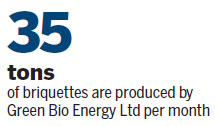Green Bio Energy enlists towns for fuel solutions
In Bwaise, a suburb in Kampala, Uganda, Peace Development Group, a community-based organization established in 2012, collects peelings of matooke, a variety of a banana that is a staple of the country.
The discarded peelings will, through a lengthy process, be converted into briquettes, which can be used as a fuel alternative to coal.
"After collecting the peelings from people's homes, we remove any residue and spread them under the sun for hours until they dry," said Prossy Nankungu, the group's treasurer.
The dried peelings are burned in a drum until they become ash. They are then poured into another vessel and left to cool.
"We then add a bit of cassava flour, already mixed with water, to the crushed stock to help it stick together," said Nankungu. "Eventually, we pour the solution into a machine that helps to partition it into briquettes."
The group's briquette machine makes about 24 per cycle. Twelve briquettes go for USh 1,000 (30 cents).
The aim of the group is to give an opportunity to unemployed members of the community to make a living by turning waste into useful products, the ones that they would make a living from. Nankungu says most of their customers are members of the community.

Green Bio Energy Ltd, which for the last couple of years has engaged communities such as these and trained them on how to effectively and efficiently make briquettes.
The company, headquartered in Kampala, Uganda, invites groups to its head offices in Kampala, or visits their workstations.
Besides Bwaise, other communities are in Namuwongo, Gayaza and Kawempe.
Green Bio Energy Ltd is one of the first for-profit renewable energy businesses to market carbonized briquettes and improved cook stoves in East Africa. Its products, services and processes are designed to achieve an environmental, economic and social impact.
This conservation journey for the social enterprise began in 2011 when two French nationals, Vincent Kienzler and Alexandre Laure, acted on their passion to tackle issues of deforestation and climate change.
"The majority of the population in Uganda uses wood and charcoal. After spending some time in Uganda, traveling, observing and discovering, they went on and started developing energy-saving solutions and technologies," said David Gerald, deputy managing director of GBE.
The inspiration for making the briquettes was to serve as a substitute for the firewood and charcoal that people were using which had disastrous effects on the environment. With a background in engineering, Kienzler designed and developed the machinery from local material. Data compiled by the World Resources Institute reveals that the planet has already lost 80 per cent of its forest cover to deforestation.
Uganda had more than 5 million hectares of forest in 1990, but only 3.5 million hectares remained by 2005.
The National Environment Management Authority warned in its State of the Environment for Uganda 2008 report that if deforestation continues at the present rate, Uganda will have lost all its forested land by 2050. It attributed the rapid rate of deforestation to expanding farmland, rapid population growth and increased urbanisation.
The founders of GBE believe that replacing wood as fuel will significantly tackle the deforestation issue. Currently, the company produces and distributes briquettes made of organic waste and residue to a wider market at an affordable cost. Their training programme enables them to control the quality of the briquettes produced in the community. The production house is located on Bukerere Road. On a Tuesday afternoon, a loud noise emerging from a machine is the first thing I hear as I make my way to the vicinity.
"The most important raw materials we use are charcoal dust and dried banana peelings, which we carbonise before eventually compressing it to a finer powder for making briquettes," Gerald said.
In 2013, GBE also started manufacturing and distributing improved cook stoves that are slow burning. Today, GBE produces about 35 tons of briquettes and 2000 stoves per month.
Juliet Nankya, a grocery dealer in Nakasero Market, who has used briquettes for the last three years hails them for burning longer than charcoal. Briquettes can burn for five to six hours. They are denser, hence offering a more intense form of energy than firewood. Despite this advantage however, according to Gerald, there is still a lack of awareness about this alternative fuel among the wider population. He said communities are currently being educated to make them aware of the use of briquettes.
The author is a writer at Green Bio Energy Ltd, one of the first renewable energy businesses to market carbonized briquettes and improved cook stoves in East Africa.
(China Daily 06/25/2016 page11)














